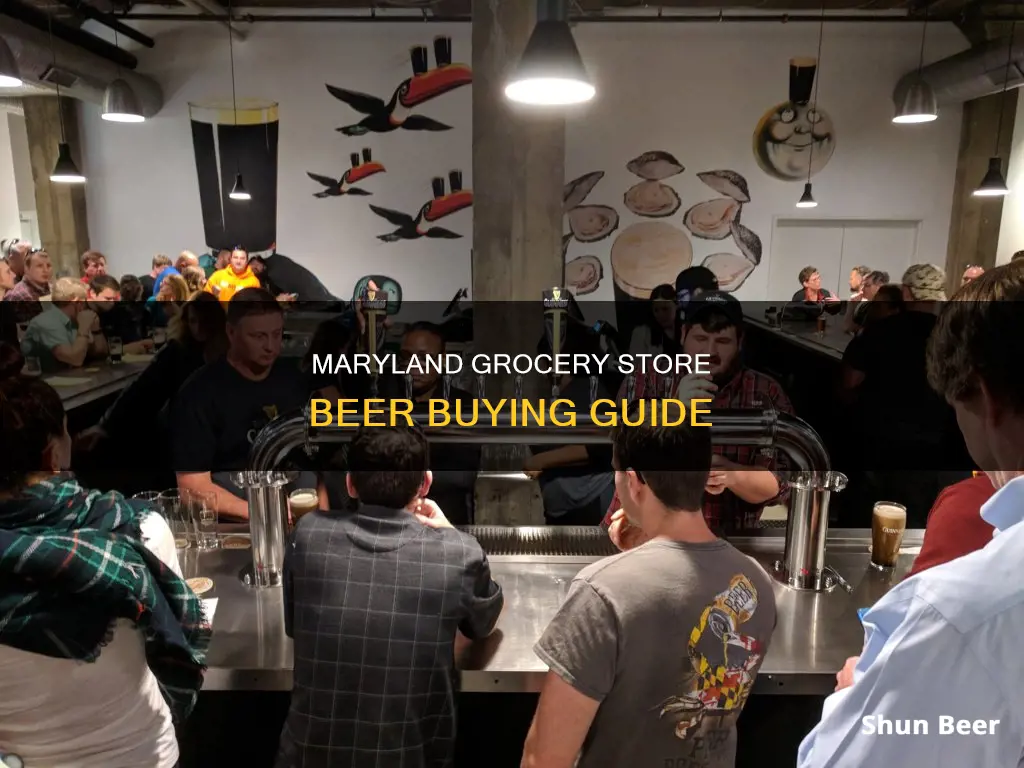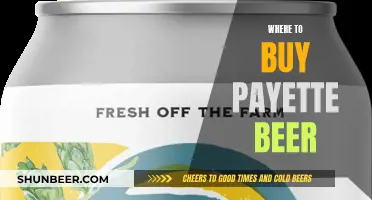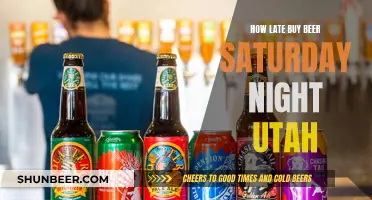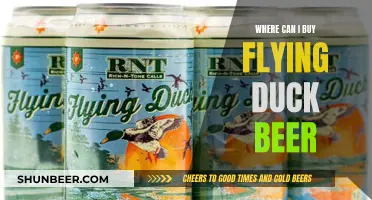
Maryland has some of the strictest alcohol laws in the US. The state is one of only a handful that restricts beer sales to liquor stores, with a 1978 law prohibiting the sale of alcohol in supermarkets and chain stores. This means that, in most cases, you cannot buy beer in grocery stores in Maryland. However, there are a few exceptions. Some grocery stores have been grandfathered in, meaning they are permitted to sell beer and wine, and some rural counties, such as Talbot, Wicomico, Worcester and St. Mary's, also allow beer and wine sales in grocery stores.
| Characteristics | Values |
|---|---|
| Can you buy beer in grocery stores in Maryland? | Generally, no. |
| Why? | Due to a 1978 statewide prohibition. |
| Are there any exceptions? | Yes, a handful of grandfathered-in chains are among the exceptions. |
| Can you buy beer at pharmacies or wholesale clubs? | Yes and no. Any chain store locations selling alcohol fall under a grandfathered law from 1978, with about 30 total locations statewide permitting the sale of beer and wine. |
| Can you buy beer at gas stations and convenience stores? | No. |
| Can you buy beer online in Maryland? | Yes, through sites like Drizly, a limited number of local stand-alone liquor stores can offer some Maryland residents beer delivered to their door. |
| Can you get beer to-go in Maryland? | Yes, a gubernatorial executive order signed in 2020 allows for wineries and restaurants to offer beer to-go while the state is under a health emergency. |
What You'll Learn
- A 1978 law prohibits the sale of beer in grocery stores in Maryland
- Some grocery stores are allowed to sell beer due to grandfather clauses
- Proposed legislation could allow grocery stores to sell beer
- Maryland residents support the sale of beer in grocery stores
- The law was designed to protect small liquor stores

A 1978 law prohibits the sale of beer in grocery stores in Maryland
A 1978 law in Maryland prohibits the sale of beer and wine in grocery stores. The law was designed to protect small "mom-and-pop" liquor stores from competition with supermarket chains. It also limits licenses to Maryland residents, who can only hold one license.
However, there are some exceptions to the law. A handful of chain stores are "grandfathered in" and are permitted to sell beer and wine, subject to individual county laws. For example, in Montgomery County, the Giant grocery store in White Oak sells beer and wine, but other Giant outlets don't. In addition, Maryland gives considerable leeway to counties and cities in regulating alcohol sales. For instance, in Talbot, Wicomico, Worcester, and St. Mary's counties, grocery stores are permitted to sell beer and wine.
There have been several attempts to change the law and allow grocery stores to sell beer and wine. In 2021, House Bill 996 and Senate Bill 763 sought to expand licensing to permit chain stores to sell beer and wine, but the bill did not pass. In 2022, a similar bill was introduced, which would put the decision to the voters in a referendum. Polls have shown strong support for allowing the sale of beer and wine in grocery stores, with support jumping from 63% in 2012 to 72% in 2022.
Kona Brewing Company Beer: Where to Buy?
You may want to see also

Some grocery stores are allowed to sell beer due to grandfather clauses
In Maryland, a 1978 law prohibits the sale of beer and wine in chain grocery stores. However, a handful of grocery stores are allowed to sell beer and wine due to grandfather clauses in the law. This means that certain stores were exempt from the prohibition when the law was passed.
The Giant grocery store in White Oak, Montgomery County, is one example of a grocery store that sells beer and wine under a grandfather clause. Talbot, Wicomico, Worcester, and St. Mary's counties also allow grocery stores to sell beer and wine. In Prince George's County, each corporation is allowed to have one location that sells these alcoholic beverages.
The laws regarding alcohol sales in Maryland vary by county, and some rural counties have more relaxed restrictions. For instance, in MoCo (Montgomery County), liquor sales are only permitted in county-owned stores.
There have been efforts to change the law and allow more grocery stores to sell beer and wine. In 2021, a bill was proposed that would have allowed grocers in food deserts to sell these alcoholic beverages as an incentive to open in higher-need areas. However, the bill was criticised for potentially taking business away from liquor stores and bringing more alcohol into poorer communities. Another attempt was made in 2022, with a bill that would put a referendum to lift the ban on beer and wine sales in grocery stores to a vote.
Best Athletic Beers: Where to Buy Them
You may want to see also

Proposed legislation could allow grocery stores to sell beer
Maryland is one of the few states in the US that prohibits the sale of beer and wine in grocery stores. A 1978 law restricts the sale of alcohol to stand-alone, non-chain stores, with licensing only available to Maryland residents. However, there are a handful of exceptions to this rule, with some grocery stores "grandfathered" into the legislation.
The current law was designed to protect small, independent "mom-and-pop" liquor stores from competition with large supermarket chains. However, many Marylanders and visitors find the law inconvenient and not in line with modern shopping habits.
There have been several attempts to change the law, with proposed legislation seeking to expand licensing to permit chain stores to sell beer and wine. In 2021, House Bill 996 and Senate Bill 763 sought to expand licensing but did not pass. A similar bill was proposed in 2022, which would have put the decision to a vote in November of that year. This bill, sponsored by Del. Lily Qi and Sen. Cory McCray, would have allowed voters to choose whether grocery stores could sell beer and wine. While this bill did not pass, there is still support for changing the law, with polls showing that almost 80% of Marylanders support allowing beer and wine sales in grocery stores.
Supporters of changing the law argue that it would bring Maryland in line with modern shopping habits and consumer expectations. It would also provide a stabilizing product for grocery stores, many of which operate at low-profit margins. Additionally, it could bring new revenue and jobs to the state, with one estimate suggesting a windfall of around $200 million from the initial sale of licenses.
Opponents of changing the law argue that it could negatively impact small liquor stores and bring more alcohol into poor communities. However, research from other states that have made similar changes suggests that small stores would only be marginally impacted.
Ginger Beer: Age Limit for Purchase?
You may want to see also

Maryland residents support the sale of beer in grocery stores
Maryland is one of the few states in the US that prohibits the sale of beer and wine in grocery stores. A 1978 law restricts the sale of alcohol to stand-alone, non-chain stores, with licensing restricted to Maryland residents. However, there are a handful of exceptions, with some stores being "grandfathered" into the law.
The law was designed to protect small, independent liquor stores from competition with large supermarket chains. However, it has been criticised for being confusing, outdated, and inconvenient for consumers.
There is significant support among Maryland residents for changing the law to allow beer and wine sales in grocery stores. A 2020 poll by Marylanders for Better Beer and Wine Laws found that more than two-thirds of residents were in favour of the change. Support has been growing, with polls showing an increase from 63% in 2012 to 73% in 2020, and even higher approval ratings in rural areas.
The Maryland Retailers Association has also advocated for this change, citing the benefits of increased convenience, consumer choice, and economic growth. They argue that the current law restricts competition and limits taxable sales, resulting in lost jobs and tax revenues for the state.
Some legislators have introduced bills to amend the law, but these have not yet passed. Delegate Lily Qi and Senator Cory McCray proposed putting the decision to a referendum, allowing voters to choose whether to lift the ban on beer and wine sales in grocery stores. This approach would give voters a direct say in the matter and bring Maryland in line with most other states in the country.
Iron City Beer: Where to Buy and Enjoy It
You may want to see also

The law was designed to protect small liquor stores
Maryland's alcohol laws have been a topic of debate for years. The state is one of only a handful that restricts beer and wine sales to liquor stores. This restriction was established by a law passed in 1978, which was designed to protect small "mom-and-pop" liquor stores from competition with large supermarket chains.
The law explicitly denies alcohol licenses to chain and discount stores and limits licenses to Maryland residents, who can only hold one license. This has created a confusing situation where some stores have been "`grandfathered in`, and are thus permitted to sell alcohol despite the restrictions.
Proponents of reforming Maryland's alcohol laws argue that the current legislation is outdated and inconvenient for consumers, who are used to being able to buy alcohol in grocery stores in other states. They also argue that it limits the opportunities for local craft breweries and wineries to showcase their products and that it negatively impacts the state's economy by reducing taxable sales, costing jobs, and reducing tax revenues.
On the other hand, some argue that changing the law could negatively impact small liquor stores and bring more alcohol into poor communities. Additionally, there is concern that large grocery stores do not need the additional revenue stream that alcohol sales would provide, whereas small liquor stores rely on these sales to stay in business.
Efforts to change the law have been ongoing, with various bills proposed in the Maryland legislature in recent years. One such bill, sponsored by Delegate Lily Qi and Senator Cory McCray, would put the decision to the voters by including a referendum on the matter in an upcoming election.
Best Places to Buy Lone Star Beer
You may want to see also
Frequently asked questions
No, generally, buying beer in chain grocery stores is restricted due to a 1978 statewide prohibition. However, a handful of grandfathered-in chains are among the exceptions.
The law was designed to protect mom-and-pop liquor stores from the competition of large supermarket chains.
Yes, there have been several attempts to change the law, including a bill sponsored by Del. Lily Qi and Sen. Cory McCray that would allow voters to choose whether grocery stores could sell beer and wine.
Yes, beer can be purchased at freestanding alcohol stores, and in some cases, at gas stations and convenience stores.







